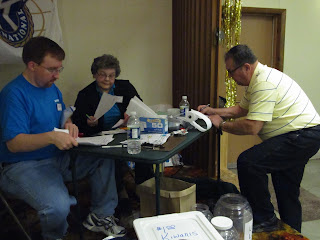David was kind enough to take me for a drive through our coverage area Tuesday. As we drove through Manchester, Sharon, Freedom, and Bridgewater with the windows rolled down, the scent of nearby farms fill the car. To some, the smell of animals and fertilizer would force their finger to the window up button. I'm different. I let the aroma linger.
The drive, especially the scents surrounding us, reminded me of my numerous drives from Westland to Adrian, where I attended college. I loved the the first time after Winter when I peacefully drove with the windows rolled down and encountered the familiar smell. There's something enchanting and cozy about rural areas. The silos and farm houses rekindle my love of Laura Ingalls Wilder's stories and often inspire me to pick up one of her books for a quick read. The drive reminded me of my college time when my future was unknown, but all possibilities existed. Some people like to stop and smell the roses. I like to stop and smell the farms.
Thursday, March 31, 2011
Monday, March 28, 2011
2010 Census: The specifics for the Greater Manchester area and Washtenaw County
For some people, last Tuesday was just that, a plain old Tuesday. But for some, including this reporter, it was like Christmas morning.
Last Tuesday was the day that detailed counts of Michigan's municipalities' populations was released by the Census Bureau. This data showed the population changes of everything from the City of Detroit, which got its population numbers decimated the last ten years, dropping to 713,777, to Pointe Aux Barques Township in Huron County, which only has 10 residents (How do they manage that?!?).
Census data, which was collected last spring, is vital to areas such as representation, growth and probably most importantly, funding. Funding for the next ten years is determined using census data, and a decrease in population can be devastating to a municipality's state-shared revenue.
Locally, numbers for the greater Manchester area varied. The Village of Manchester saw a slight decrease, going from 2,170 in 2000 to 2,091, a decrease of 79 people, or 3.6 percent.
The data was much different for Manchester Township, which saw an increase of people. The township gained 438 people, going up from 4,097 to 4,569, a 11.5 percent increase.
In Bridgewater Township, very little change in population took place, with an additional 23 people registering as living in the township. In 2010, 1,674 people lived in Bridgewater Township, compared to 1,651 11 years ago. Same thing applied to Sharon Township, with only a 3.5 percent increase, going from 1,678 to 1,737.
Freedom Township was the only township in the southwest corner of Washtenaw County to lose population, going from 1,573 to 1,428, a decrease of 9.2 percent.
Overall, the Greater Manchester area (the village and the four surrounding townships) had a population of 11,578.
The trend in the southwest corner of the county seemed similar to what happened across the county, except in smaller terms. More city populations decreased this cycle, and more people are living in outside townships. To see other municipalities in Washtenaw County's population, check out the map below and click on a marker.
Last Tuesday was the day that detailed counts of Michigan's municipalities' populations was released by the Census Bureau. This data showed the population changes of everything from the City of Detroit, which got its population numbers decimated the last ten years, dropping to 713,777, to Pointe Aux Barques Township in Huron County, which only has 10 residents (How do they manage that?!?).
Census data, which was collected last spring, is vital to areas such as representation, growth and probably most importantly, funding. Funding for the next ten years is determined using census data, and a decrease in population can be devastating to a municipality's state-shared revenue.
Locally, numbers for the greater Manchester area varied. The Village of Manchester saw a slight decrease, going from 2,170 in 2000 to 2,091, a decrease of 79 people, or 3.6 percent.
The data was much different for Manchester Township, which saw an increase of people. The township gained 438 people, going up from 4,097 to 4,569, a 11.5 percent increase.
In Bridgewater Township, very little change in population took place, with an additional 23 people registering as living in the township. In 2010, 1,674 people lived in Bridgewater Township, compared to 1,651 11 years ago. Same thing applied to Sharon Township, with only a 3.5 percent increase, going from 1,678 to 1,737.
Freedom Township was the only township in the southwest corner of Washtenaw County to lose population, going from 1,573 to 1,428, a decrease of 9.2 percent.
Overall, the Greater Manchester area (the village and the four surrounding townships) had a population of 11,578.
The trend in the southwest corner of the county seemed similar to what happened across the county, except in smaller terms. More city populations decreased this cycle, and more people are living in outside townships. To see other municipalities in Washtenaw County's population, check out the map below and click on a marker.
Thursday, March 17, 2011
Sharon United Methodist Church Lenten fish fry: behind the scenes
While most people were enjoying the warm(er) weather last Friday, many residents were at the Sharon United Methodist Church on Pleasant Lake Road in Sharon Township prepping for the first Friday fish fry.
The fish fry dinner, which takes place each Friday during Lent (except for Good Friday) is a tradition predominantly done by Roman Catholic groups, since the eating of red meat and poultry is forbidden on Fridays during the season (Interestingly enough, it's a common occurrence year-round in Wisconsin).
Everyone knows fried fish is tasty, but what does it take to prep the meal? Here are some behind-the-scenes photos from the prep work done last week.
And the fish fry isn't the only Lenten meal taking place in Manchester this year. Each Thursday, St. Mary's Catholic Church will be hosting a loaded baked potato dinner at the church. What types of foods do you commonly eat during Lent?
The fish fry dinner, which takes place each Friday during Lent (except for Good Friday) is a tradition predominantly done by Roman Catholic groups, since the eating of red meat and poultry is forbidden on Fridays during the season (Interestingly enough, it's a common occurrence year-round in Wisconsin).
Everyone knows fried fish is tasty, but what does it take to prep the meal? Here are some behind-the-scenes photos from the prep work done last week.
And the fish fry isn't the only Lenten meal taking place in Manchester this year. Each Thursday, St. Mary's Catholic Church will be hosting a loaded baked potato dinner at the church. What types of foods do you commonly eat during Lent?
Tuesday, March 8, 2011
Crazy Cash Night
When I arrived at the American Legion Hall at about 9:30 p.m. Saturday, I had planned to stay until the final ball was drawn and get a reaction photo from the winner.
One slight problem: the winner wasn't in attendance. Jerry Humitz, a Kiwanis Club member, had gone out and spent time with some family that came into town. Humitz was the first winner of the $5,000 main prize that wasn't there to collect his winnings since the first Crazy Cash Night more than a decade ago.
But overall, the night ended in success. Tickets Nos. 199 and 200 were auctioned off for $500 and $1,250, respectively, and plenty came and enjoyed dinner.
In case you missed it, here are some additional photos from the night. For a video showing the last ball being pulled, check it out here in the story.
One slight problem: the winner wasn't in attendance. Jerry Humitz, a Kiwanis Club member, had gone out and spent time with some family that came into town. Humitz was the first winner of the $5,000 main prize that wasn't there to collect his winnings since the first Crazy Cash Night more than a decade ago.
But overall, the night ended in success. Tickets Nos. 199 and 200 were auctioned off for $500 and $1,250, respectively, and plenty came and enjoyed dinner.
In case you missed it, here are some additional photos from the night. For a video showing the last ball being pulled, check it out here in the story.
Tuesday, March 1, 2011
14th annual Men's Club Chili Cookoff
I'm not originally from Manchester, or any small town that features chili cookoffs. But Saturday's event, even though organizers said numbers were down (at blame was the state wrestling meet, Treasurer Bob Rhees said, which sent 14 Manchester wrestlers), was an impressive display of some awesome cooking, especially for a city kid like me.
By the time I left, which was about 6 p.m., the American Legion Hall was packed with people, and it smelled fantastic. The LaBlanc family from Onsted won the top prize of $200, with their southwestern chili recipe. Overall, a few hundred people showed up to sample only 11 cooks' chili. Here are some photos from the evening, which also featured a 32-person euchre tournament:
By the time I left, which was about 6 p.m., the American Legion Hall was packed with people, and it smelled fantastic. The LaBlanc family from Onsted won the top prize of $200, with their southwestern chili recipe. Overall, a few hundred people showed up to sample only 11 cooks' chili. Here are some photos from the evening, which also featured a 32-person euchre tournament:
Subscribe to:
Comments (Atom)

























